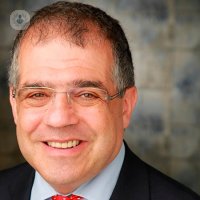Can repetitive transcranial magnetic stimulation (rTMS) really treat depression?
Written by:Transcranial magnetic stimulation (rTMS) is an evidence-based treatment for treatment-resistant depression (TRD).
After receiving approval from NICE 2015, rTMS began developing in the UK. While very popular in North America, this treatment is still not as well known here. rTMS is being offered in several NHS clinics and by an increasing number of private providers.
One of our top doctors, Dr Leon Rozewicz, is one of the psychiatrists who offers this in the UK. He is a member of the Outreach Committee of the Clinical TMS Society. This organisation sets standards for rTMS worldwide and informs all TMS providers of advances in the field.

What happens during the rTMS sessions?
Transcranial magnetic stimulation creates magnetic fields which induce small electrical currents in the brain. These currents increase blood flow in the brain and improve the flow of neurotransmitters between nerve cells.
During the session, an electromagnetic coil is placed on the side of your head. When the machine is turned on you will hear loud clicking sounds and will feel a tapping sensation on your scalp. Sessions last between three and twenty minutes.
Following each session, you’ll still be able to leave the clinic and continue your usual daily activities.
In what way does it help people with depression?
The magnetic pulses are thought to stimulate regions of the brain that control your mood and depression. This stimulation improves communication in brain pathways which are involved in depression.
Studies have shown that 30% of people make a complete recovery from depression and 60% show a significant reduction in symptoms.
When should a patient start to see an improvement?
Typically, patients improve in the first week of treatment, some patients may take up to three weeks to improve.
How do you decide if someone should undergo rTMS?
rTMS is used in patients who have not responded to anti-depressants or in whom anti-depressants are not suitable because of adverse effects.
Can this treatment be used in combination with others?
Yes. You can use it in combination with anti-depressants and other therapies too, such as psychotherapy - you don’t have to stop any of them. Most people decide to continue with their usual treatments to maximise the effect, whilst others decide not to. I will carefully consider the best way to combine rTMS with other treatments.
If you are interested in this treatment, visit Dr Leon Rozewicz’s Top Doctors profile and book a consultation with him.


